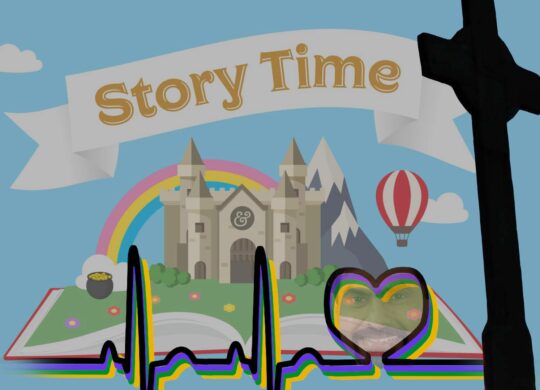Story!

Psalm 78 is the longest psalm in the Psalter after Psalm 119. But unlike the latter, the former is a recital of narratives—a double recital, actually. Two rehearsals of events that happened at and around the exodus of the Israelites from Egypt. They highlight the failures of God’s people despite his gracious provision and his compassion.
And He, being compassionate,
forgave iniquity and did not destroy,
and often turned back His anger
and did not stir all His wrath.
And He remembered that flesh they were ….
How much they rebelled against Him in the wilderness,
[and] grieved Him in the wasteland!
Psalm 78:38–40
While that in itself is a lesson all of us need to learn, there is also something else going on.
The first eight verses of the psalm declare the intention of the psalmist to teach readers/listeners through these recitals of history …
… so that the generation to come might know,
children to be born;
they will arise and recount to their children,
and they will place their confidence in God
and will not forget the doings of God,
and observe His commandments,
and they will not be like their fathers.
Psalm 78:6–8
And did you know that when people listen to a story, a narrative, a recital like those in Psalm 78, their heart rates sync? I didn’t either. Not till an article appeared in Cell Reports last month: “Conscious Processing of Narrative Stimuli Synchronizes Heart Rate Between Individuals,” by an international group of scientists.
We find significant inter-subject correlation of heart rate (ISC-HR) when subjects are presented with an auditory or audiovisual narrative. We find that ISC-HR is reduced when subjects are distracted from the narrative, and higher ISC-HR predicts better recall of the narrative.”
The researchers monitored heart rates via EKG will having subjects listen to or watch diffenret types of stories, including Jules Vere’s “20,000 Leagues Under the Sea” and children’s stories.
Said Dr. Lucas Parra, of City College of New York and a senior author on the study:
The fluctuations of our heart rates are not random. It’s the story that drives the heart. There’s an explicit link between people’s heart rates and a narrative.”
And when the participants were distracted by having them count backwards, their hearts became desynchronized (and they remembered less of the story, too).
Indeed, there is a creation of community as these narratives are rehearsed and recited and heartrates get synced. The subjects do not even have to be together!
Parra:
The results are heartwarming. The novel finding is that heart rate correlation between subjects does not require them to actually be interacting, or even be in the same place. They can be listening to stories all alone at home, and their heart rate fluctuations will align with the story, and thus correlate with other listeners. It’s not the interaction between people but the story itself that does the trick.”
As the article concluded:
There is no need for individuals to directly interact, be related to one another, or perceive the stimulus together at the same time.”
Amazing!
Someone reading Psalm 78 in some century across the globe can, I suppose, have the same heartrate modulations as I have, reading it in the twenty-first century in Kentucky!
Give ear, my people, to my law;
turn your ears to the words of my mouth.
I will open my mouth in a parable;
I will pour out mysteries of old,
which we have heard and known,
and [which] our fathers recounted to us.
Psalm 78:1–3
Sync those heart rates!
SOURCE:
Cell Reports; The Wall Street Journal











 Abe Kuruvilla is the Carl E. Bates Professor of Christian Preaching at The Southern Baptist Theological Seminary (Louisville, KY), and a dermatologist in private practice. His passion is to explore, explain, and exemplify preaching.
Abe Kuruvilla is the Carl E. Bates Professor of Christian Preaching at The Southern Baptist Theological Seminary (Louisville, KY), and a dermatologist in private practice. His passion is to explore, explain, and exemplify preaching.